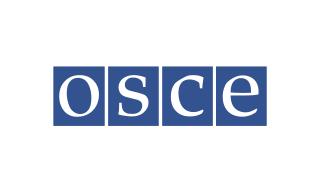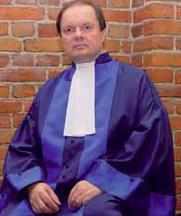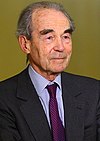
The Organization for Security and Co-operation in Europe (OSCE) is a regional security-oriented intergovernmental organization comprising member states in Europe, North America, and Asia. Its mandate includes issues such as arms control, the promotion of human rights, freedom of the press, and free and fair elections. It employs around 3,460 people, mostly in its field operations but also in its secretariat in Vienna, Austria, and its institutions. It has observer status at the United Nations.

The Permanent Court of Arbitration (PCA) is a non-UN intergovernmental organization located in The Hague, Netherlands. Unlike a judicial court in the traditional sense, the PCA provides services of arbitral tribunal to resolve disputes that arise out of international agreements between member states, international organizations or private parties. The cases span a range of legal issues involving territorial and maritime boundaries, sovereignty, human rights, international investment, and international and regional trade. The PCA is constituted through two separate multilateral conventions with a combined membership of 122 states. It is not a United Nations agency, but a United Nations observer.

The Commission on Security and Cooperation in Europe (CSCE), also known as the U.S. Helsinki Commission, is an independent U.S. government agency created by Congress in 1975 to monitor and encourage compliance with the Helsinki Final Act and other Organization for Security and Co-operation in Europe (OSCE) commitments. It was initiated by House representative Millicent Fenwick and established in 1975 pursuant to Public Law No. 94-304 and is based at the Ford House Office Building.

The politics of Europe deals with the continually evolving politics within the continent of Europe. It is a topic far more detailed than other continents due to a number of factors including the long history of nation states in the region as well as the modern day trend towards increased political unity amongst the European states.

The United Nations Commission on International Trade Law (UNCITRAL) is a subsidiary body of the U.N. General Assembly (UNGA) responsible for helping to facilitate international trade and investment.
The International Centre for Settlement of Investment Disputes (ICSID) is an international arbitration institution established in 1966 for legal dispute resolution and conciliation between international investors and States. ICSID is part of and funded by the World Bank Group, headquartered in Washington, D.C., in the United States. It is an autonomous, multilateral specialized institution to encourage international flow of investment and mitigate non-commercial risks by a treaty drafted by the International Bank for Reconstruction and Development's executive directors and signed by member countries. As of May 2016, 153 contracting member states agreed to enforce and uphold arbitral awards in accordance with the ICSID Convention.
The office of the OSCE High Commissioner on National Minorities (HCNM) is charged with identifying and seeking early resolution of ethnic tension that might endanger peace, stability or friendly relations between and within the participating states of the Organization for Security and Co-operation in Europe.
International arbitration is arbitration between companies or individuals in different states, usually by including a provision for future disputes in a contract.
The OSCE Minsk Group was created in 1992 by the Conference on Security and Cooperation in Europe (CSCE), now Organization for Security and Co-operation in Europe (OSCE), to encourage a peaceful, negotiated resolution to the conflict between Azerbaijan and Armenia over Nagorno-Karabakh.

Arbitration is a formal method of alternative dispute resolution (ADR) involving a neutral third party who makes a binding decision. The dispute will be decided by one or more persons, which renders the 'arbitration award'. An arbitration decision or award is legally binding on both sides and enforceable in the courts, unless all parties stipulate that the arbitration process and decision are non-binding.
Christian Tomuschat is a German jurist. He is emeritus professor of public international law and European law at the Humboldt University in Berlin and is a former member of the UN Human Rights Committee and the UN's International Law Commission.
Alternative dispute resolution (ADR), or external dispute resolution (EDR), typically denotes a wide range of dispute resolution processes and techniques that parties can use to settle disputes with the help of a third party. They are used for disagreeing parties who cannot come to an agreement short of litigation. However, ADR is also increasingly being adopted as a tool to help settle disputes within the court system.
The Tehran Communiqué, also known as the Joint statement of the heads of state in Tehran is the joint communiqué mediated by Iranian President, Akbar Hashemi Rafsanjani and signed by the acting President of Azerbaijan, Yagub Mammadov and President of Armenia, Levon Ter-Petrossian on May 7, 1992 with an intention to end the four-year-long hostilities between Armenia and Azerbaijan over the Nagorno-Karabakh region, a former autonomous oblast of the Azerbaijan SSR.

The Manila Accord was signed on 31 July 1963 by the Federation of Malaya, the Republic of Indonesia and the Republic of the Philippines, after a meeting from 7 to 11 June 1963 in Manila.
The General Act for the Pacific Settlement of International Disputes is a multilateral convention concluded in Geneva on September 26, 1928. It went into effect on August 16, 1929 and was registered in League of Nations Treaty Series on the same day. The treaty was ultimately ratified by 22 states. It was subsequently denounced by Spain.
Ambassador Ersin Erçin is a senior Turkish diplomat, with an extensive experience in multilateral diplomacy particularly on matters of international, Euro-Atlantic and Eurasian security, disarmament, and economic and environmental security.

Erkki Antero Kourula is a Finnish judge who served as a judge of the International Criminal Court (ICC).

Relations between Azerbaijan and the Organization for Security and Cooperation in Europe (OSCE) began when Azerbaijan joined OSCE’s predecessor, the Conference on Security and Cooperation in Europe (CSCE), on January 30, 1992. This was the first European organization Azerbaijan joined. The CSCE transformed into the OSCE shortly afterwards in 1995.

The OSCE Special Monitoring Mission to Ukraine was an international civilian observer mission of the Organization for Security and Cooperation in Europe (OSCE) mandated to contribute to reducing tensions and to help foster peace in Ukraine. The mission was deployed in March 2014, following the Russian annexation of Crimea and the outbreak of open conflict in eastern Ukraine. The mission ended on 31 March 2022, following the Russian invasion of Ukraine.

Armenia–OSCE relations began when Armenia joined the OSCE's predecessor, the Conference on Security and Cooperation in Europe (CSCE), on 30 January 1992. The CSCE transformed into the Organization for Security and Co-operation in Europe (OSCE) shortly afterwards in 1995.












